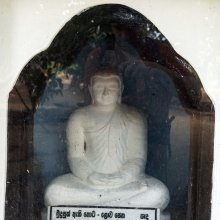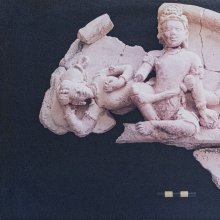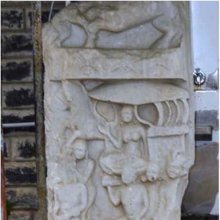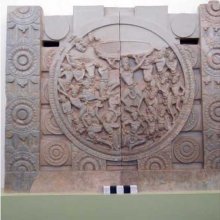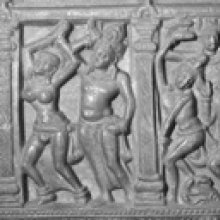Siddhartha, Siddhārtha, Siddhārthā, Siddha-artha: 35 definitions
Introduction:
Siddhartha means something in Buddhism, Pali, Hinduism, Sanskrit, Jainism, Prakrit, the history of ancient India, Hindi, biology. If you want to know the exact meaning, history, etymology or English translation of this term then check out the descriptions on this page. Add your comment or reference to a book if you want to contribute to this summary article.
Siddhartha has 34 English definitions available.
Images (photo gallery)
(+7 more images available)
Languages of India and abroad
Sanskrit dictionary
[Deutsch Wörterbuch]
Source: Cologne Digital Sanskrit Dictionaries: Böhtlingk and Roth Grosses Petersburger WörterbuchSiddhārtha (सिद्धार्थ):—(siddha + artha)
1) adj. (f. ā) a) der seinen Zweck erreicht hat [Mahābhārata 5, 7546.] [Harivaṃśa 10003.] [Rāmāyaṇa 1, 6, 7. 42, 4. 2, 40, 25 (39, 31 Gorresio). 51, 18 (48, 18 Gorresio). 72, 37 (74, 41 Gorresio). 86, 18 (94, 18 Gorresio). 88, 16. 103, 10.] [Rāmāyaṇa Gorresio 2, 58, 10. 109, 60. 3, 24, 10. 4, 40, 70.] [Spr. (II) 2692. 3639.] [Śākuntala 27, 9.] [Kathāsaritsāgara 57, 100. 99, 9. 108, 17.] [Bhāgavatapurāṇa 9, 4, 32.] su [Mahābhārata 3, 3006.] a [Rāmāyaṇa 3, 55, 20.] [Bhāgavatapurāṇa 4, 9, 28.] — b) zum Ziele führend, wirksam: upāya [Harivaṃśa 3145.] oṣadhī [Rāmāyaṇa 2, 25, 36.] — c) dessen Absicht, Vorhaben bekannt ist: siddhārthaṃ siddhasaṃbandhaṃ śrotuṃ śrotā pravartate . granthādau tena vaktavyaḥ saṃbandhaḥ saprayojanaḥ .. iti vyākaraṇaṭīkā [Śabdakalpadruma] —
2) m. a) weisser Senf (Senfkorn) [Amarakoṣa 2, 9, 18.] [Trikāṇḍaśeṣa 3, 3, 200.] [Hemacandra’s Abhidhānacintāmaṇi 1180.] [Anekārthasaṃgraha 3, 324.] [Medinīkoṣa th. 25.] [Halāyudha 2, 426.] [Suśruta 1, 71, 17. 2, 231, 3.] [Varāhamihira’s Bṛhajjātaka S. 44, 5.] [Kathāsaritsāgara 32, 183.] [Bhāgavatapurāṇa 4, 9, 58. 5, 17, 21. 25, 2.] [Bhaṭṭikavya 14, 91.] gaura [Kumārasaṃbhava 7, 7.] sita [Pañcatantra 158, 3.] — b) = vaṭavṛkṣa [Rājanirghaṇṭa 11, 121.] — c) Bez. des 53ten Jahres im 60jährigen Jupitercyclus [Varāhamihira’s Bṛhajjātaka S. 8, 48. fg.] — d) Nomen proprium eines Dānava [Kathāsaritsāgara 47, 25.] eines Wesens im Gefolge Skanda's [Mahābhārata 9, 2566.] eines Fürsten [1, 2696.] eines Rathgebers des Daśaratha [Rāmāyaṇa 1, 7, 3. 2, 36, 18. 68, 5 (70, 5 Gorresio). 7, 59, 3, 26.] weltlicher N. Śākyamuni’s [Trikāṇḍaśeṣa] (lies buddhe st. bṛddhe). [Hemacandra’s Anekārthasaṃgraha] [Medinīkoṣa] [Halāyudha 1, 85.] [Rgva tch’er rol pa ed. Calc. 279, 4.] [BURNOUF,] [?Intr. 70, Nalopākhyāna Lot. de Lassen’s Anthologie b. l. 388. 607. WASSILYEW 9. 10.] Nomen proprium eines Versuchers (māraputra) [Rgva tch’er rol pa ed. Calc. 393, 7.] des Vaters von Mahāvīra (dem 24ten Arhant der gegenwärtigen Avasarpiṇī) [Hemacandra’s Abhidhānacintāmaṇi 38.] [Hemacandra’s Anekārthasaṃgraha] [Colebrooke 2, 318.] [WILSON, Sel. Works 1, 292. fg. -] [Kathāsaritsāgara 44, 25. 121.] —
3) f. ā Nomen proprium der Mutter des 4ten Arhant's der gegenwärtigen Avasarpiṇī [Hemacandra’s Abhidhānacintāmaṇi 39.] —
4) n. (sc. vāstu) ein Gebäude mit zwei Hallen, einer im Westen und einer im Süden, [Varāhamihira’s Bṛhajjātaka S. 53, 39. fg.] — Vgl. sarvārthasiddha .
Sanskrit, also spelled संस्कृतम् (saṃskṛtam), is an ancient language of India commonly seen as the grandmother of the Indo-European language family (even English!). Closely allied with Prakrit and Pali, Sanskrit is more exhaustive in both grammar and terms and has the most extensive collection of literature in the world, greatly surpassing its sister-languages Greek and Latin.
See also (Relevant definitions)
Partial matches: Siddha, Artha.
Starts with: Siddharthabuddhi, Siddharthacarita, Siddharthah, Siddharthaka, Siddharthakarin, Siddharthamanin, Siddharthamati, Siddharthapriccha, Siddharthapricha, Siddharthapura, Siddharthasamhita, Siddharthavriksha.
Ends with: Asiddhartha, Prasiddhartha, Samsiddhartha, Sarvasiddhartha, Sarvvasiddhartha, Sitasiddhartha, Susiddhartha.
Full-text (+108): Sarvasiddhartha, Mahavira, Asiddhartha, Gautama, Trishala, Kapilavatthu, Siddharthakarin, Siddharthacarita, Siddharthamati, Kulabaddha, Yashodhara, Siddharthasamhita, Kundapura, Siddharthamanin, Siddharthapriccha, Channa, Siddhasambandha, Chhandak, Siddhattha, Kundagrama.
Relevant text
Search found 77 books and stories containing Siddhartha, Siddha-artha, Siddha-arthā, Siddhārtha, Siddhārthā; (plurals include: Siddharthas, arthas, arthās, Siddhārthas, Siddhārthās). You can also click to the full overview containing English textual excerpts. Below are direct links for the most relevant articles:
Siddhartha: Hermann Hesse’s ‘Prilgrim’s Progress’ < [October – December, 1998]
Hermann Hesse’s Siddhartha and ‘The Ancient < [July – September, 1995]
The Gardener < [December 1943]
Bhagavati-sutra (Viyaha-pannatti) (by K. C. Lalwani)
Part 3 - On patriarchs < [Chapter 5]
Part 21 - On the course of life of the non-restrained < [Chapter 1]
Trishashti Shalaka Purusha Caritra (by Helen M. Johnson)
Part 4: Description of queen Siddhārthā (Abhinandana’s mother) < [Chapter II - Abhinandanacaritra]
Part 5: Birth of Abhinandana < [Chapter II - Abhinandanacaritra]
Part 20: Bharata’s pūjā and stutis to the Arhats < [Chapter VI]
Amaravati Art in the Context of Andhra Archaeology (by Sreyashi Ray chowdhuri)
Upbringing in the Palace < [Chapter 3 - Amarāvatī and the Formative Stage of the Buddhist Art]
Birth of Rāhula < [Chapter 3 - Amarāvatī and the Formative Stage of the Buddhist Art]
Marriage of Siddhārtha < [Chapter 3 - Amarāvatī and the Formative Stage of the Buddhist Art]
Puranic encyclopaedia (by Vettam Mani)
Kalpa-sutra (Lives of the Jinas) (by Hermann Jacobi)
Related products
